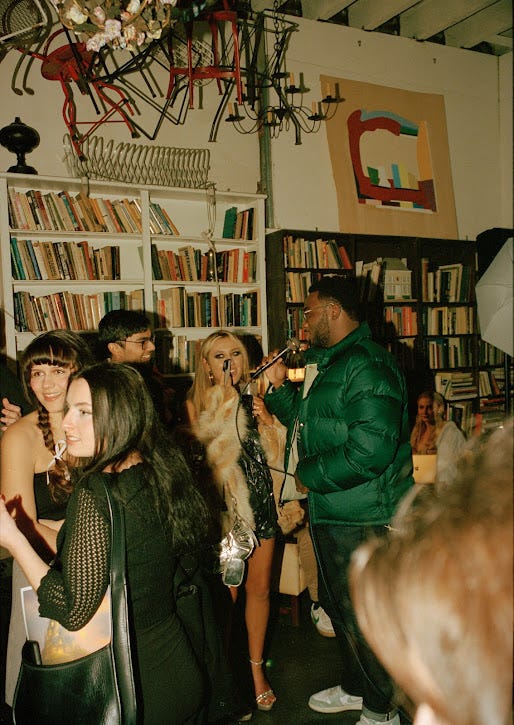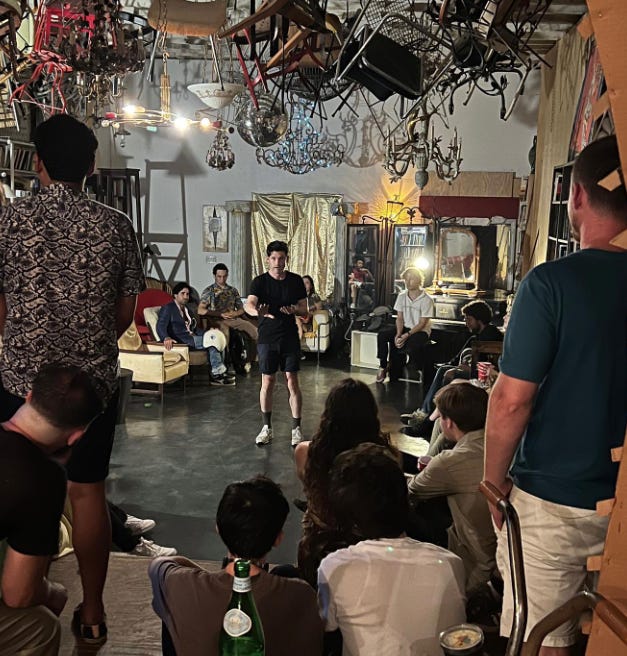Why are Credentialed Writers Mad About Beckett's?
On underdogs, monoculture, and vitality
When I hosted my first Mars Review event at Beckett’s in July, 2022, the electricity would not come on. I figured that was alright. We would do it by candlelight if need be. Maybe that would be better, actually. It was a sticky summer day, and I was more worried about the heat than about the dark. The other concern was how many people would show up. Like an anxious lover, a Beckett’s event organizer always worried his efforts to drum up enthusiasm were much too much or much too little. As usual Beckett became frenetic and focused as we approached showtime. As usual I was a bit, let’s say, relaxed about details. We were the perfect team.1 The electricity came back on. It was sweltering inside, but in a hot girl summer sort of way and not in a keeling over in the street sort of way. There was a dramatic monologue from George Olesky. There was a dance performance by Cassidy Grady with piano accompaniment by Matt Gasda. All had a good time. No Whiting Award-winners or PEN America members were harmed during the curation of this event.
I add that last sentence because a number of established writers on Twitter have hallucinated that Alex Vadukul’s fun and wholly innocuous NYT Styles piece about a guy who has events in his living space to be an attack on their own taste, their own favorite reading series, and perhaps on the American Way of Life itself. Alexander Chee has questioned the author’s “unfuckingbelievable gall.” (Chee would prefer on the curator of his own favorite reading series, which he believes has received insufficient press. You be the judge.) Roxane Gay wonders whether the Times has “given up on fact-checking.” (Next she’ll be calling it “Fake News”!). Maggie Doherty speculates that French sociologist Pierre Bourdieu would “have a field day” dissecting an article in which the owner of a brownstone is equated with the “creative underclass.” (Actually, the fact that Beckett didn’t own the place is printed squarely in the Times piece—although Bourdieu might well have taken an interest in the Dickensian legal battles over the building’s fate.)
Christian Lorentzen, a critic and regular of the space, with whom I read at the most recent event “The Rear End,” chalks up [paywalled] the writers’ ire to a misinterpretation of some words spoken in jest about the difference between Beckett’s and above-ground venues such as KGB and Franklin Park. But as usual, there’s as much truth in fantasy as there is in reality. Although there wasn’t much to get upset about in the article, these authors intuit that for some reason they ought to be upset. What are their fantasies pointing to?
The first thing that I can observe is the modern person’s obsession with the idea that he or she must be the underdog (or, as René Girard would put it, the victim). Unfortunately for the credentialed writers who would like to think this of themselves, it simply isn’t the case here. Those reading at Beckett’s as often as not had nothing published at all, and were selected in the most ad hoc manner imaginable. The complainants, meanwhile, have published with major presses and received prestigious prizes. Which is ok! It’s no knock, in my mind, for a writer to have a book that sells well and a teaching gig at a top university. Certainly good work if you can get it. In her tweet linked above, Doherty implies that it’s not actually well-paying work, even for successful writers, which may be the case, and is too bad. But having spent a lot of time at Beckett’s, and a lot of time in the prestige publishing/MFA world, there’s really no comparison.
The second point is a related one. Like it or not, the literary world has become highly professionalized, and those carping about the Times article are fair representatives of this professional clique or class or whatever you want to call it. Now, to be a professional is no sin. But in the age of the internet, where the panopticon watches all behavior and threatens all aberrant behavior with disciplinary measures in the professional realm, the professionalization of literature has led to what can only be called a monoculture. The same sorts of books get written, the same sorts of covers get designed, and the same sorts of blurb tie it all up with a nice bow. Beckett’s was walled off from that. Partly because the events were—unlike most things in the internet age—not meant to draw as much publicity as possible, but to remain at least a little bit hush hush, they operated according to a subcultural logic that has been all but forgotten since 2016 or so. This is a large part of what made them fun.
When I did that Mars Review party in July, George Olesky began his monologue by introducing himself as me—before admitting that it was a prank and that we were different people. He told intimate details about his life while pacing about an audience sitting on the floor encircling him (I don’t know whether they’re fictional or not.) He carped (humorously) about not appearing in the play Dimes Square. It was personal, weird, draining, and rather glorious. It isn’t something that would have happened at a more above-ground event. It would have been a safety hazard, in more ways than one.
Whether one liked what they saw at these events is obviously a matter of taste. But the last thing worth mentioning, which clearly separated the events from other readings I’ve been a part of (whether as a reader at KGB or an organizer at a publishing house) was an observable youth and vitality. Vadukul captures this very well in his piece, as did the Times’s photgrapher, and I wonder whether this vitality is a large part of what has gotten these authors’ goats.
The vitality of the events was a direct result of the fact that they were not professionalized. In a brilliant article analogizing digital worlds to biological ones, the writer N. E. Davis has posited that the lack of barriers brought on by the internet has compromised our intellectual immune systems. “The innate immune system responds non-specifically to pathogens,” Davis writes, “[a]ny immune system must have a way of deciding what is me and what is not-me.” Since the advent of the internet I think we’ve all had a harder time than usual deciding what is me and what is not-me, and that difficulty leads to a fearfulness and loss of vitality. That big grey door outside Beckett’s presented a barrier (as did the thick cigarette smoke), and they made the place alive thereby.
At the end of that hot July event I remember saying that I never wanted to put on another one again. It was exhausting, and we didn’t make that much money anyway. But then people kept asking me about the next one. So we did another in September for our Issue 2 launch. Then another party in February with more dancing and music. Each one was bigger than the last. And with each one, Beckett and I got better at what we were doing and, I think, were able to relax a bit more and have more fun. It’s sad to see it all end, but even if the space dies I have a feeling this new-found vitality will continue. As one friend said of the space, “the more it ends, the more it begins.”
It helped immeasurably that on this occasion I had a work friend with experience in events who gamely stocked up on supplies while I fussed with magazine placement and QR codes. If you’re reading this, thank you!





Thank you Noah!
I'm sure some have genuine ideological opposition to this whole scene, but why do I get the feeling that NYC media's obsession with it is less about principles and more about fear of aging? That culture's sensibilities, which once were bold and youthful and alluring, have achieved middle age, gained much institutional hold (congrats!) and are now becoming your mom and dad's ideology (quite literally, since at least half of millennials are solidly in the parental age bracket now).
"The world’s coolest party was happening five minutes up the road in New York – how did I miss it?": https://www.theguardian.com/commentisfree/2022/jun/15/dimes-square-worlds-coolest-party-new-york
Nothing more, nothing less.